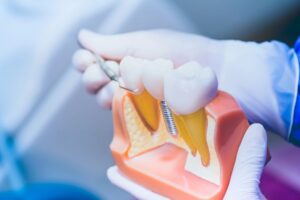
If you have lost one or more teeth, your dentist or oral surgeon has probably suggested that you consider getting dental implants. Dental implants are popular because they serve as prosthetic tooth roots and can provide a very strong base of support for restorations, such as crowns, bridges, and dentures. In fact, they are widely regarded as the absolute best form of tooth replacement!
However, you might be a bit reluctant to commit to implants once you learn that they are usually made of metal. Is it possible for them to rust? This blog post explains what you should know.
Can Dental Implants Rust?
Can dental implants rust? In order to answer that question, it is important to note that there is a difference between rust and corrosion. Corrosion is a general term for the oxidation of various metals; chemical reactions cause them to start deteriorating. Rust is a specific type of corrosion that only affects iron and alloys that contain iron.
The vast majority of dental implants are made of titanium. Some might have a tiny bit of iron in them. However, given their composition, rust is extremely unlikely to occur.
Corrosion, on the other hand, is a bit more likely. In rare instances, reactions between a patient’s saliva, their dental implants, their jawbone, and other metals in their mouth can create weak electrical pulses. That, in turn, can cause the dental implants to start deteriorating.
How Common Is Dental Implant Corrosion?
There are no readily available statistics that touch on how often corrosion is responsible for dental implant failure. However, there are some facts that are worth considering:
- Dental implant failure from any cause is rare. In fact, many studies estimate that implants are successful in over 95% of cases.
- Most people enjoy decades of reliable function from their dental implants.
- The most common cause of dental implant failure is not corrosion. Rather, it is an infection known as peri-implantitis, which occurs when bacteria attack the tissue around an implant. Often, peri-implantitis arises due to a lack of proper oral hygiene.
Weighing the Risks and Rewards
Risk-free medical and dental procedures do not exist. However, there are many low-risk treatment options, including dental implants. Your dentist would not recommend them for you unless they believed the rewards far outweigh any potential downsides. They are, without question, the best way to rebuild missing teeth!
Meet the Practice
Piney Point Dental Implant Center is home to three board-certified oral and maxillofacial surgeons. They provide top-quality dental implant care, and they always strive to be honest and straightforward with patients who have concerns about the risk of any given treatment. If you have questions about dental implants, they and our support team would be happy to speak with you. Contact our Houston office at 713-597-7340.

